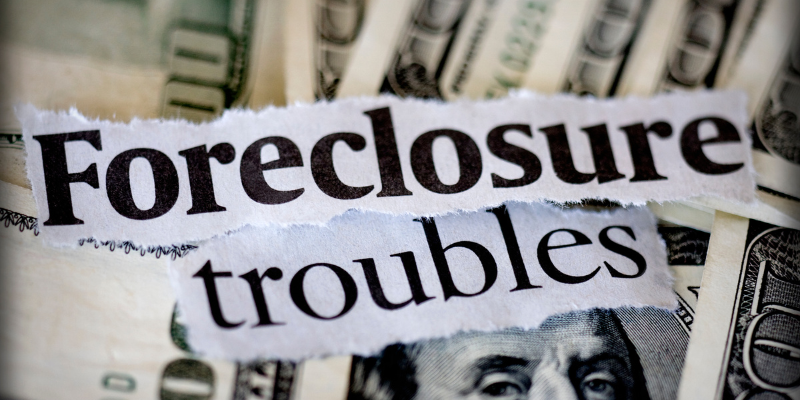
If you’ve received a foreclosure notice—or know one might be coming—it’s important to act quickly. In Texas, the foreclosure process moves fast. In some cases, you could have less than 21 days before your home is auctioned. But even in a tight timeline, you still have options.
Whether your goal is to keep your home or move on with as little financial damage as possible, this guide will walk you through the steps you can take right now. From understanding the timeline and your legal rights to exploring options like loan modification, forbearance, or even selling your home to avoid foreclosure—this article is here to help you regain control and move forward with clarity.
In This Guide
- What Is Foreclosure in Texas?
- Texas Foreclosure Timeline
- Immediate Steps After Receiving a Foreclosure Notice
- Ways to Stop Foreclosure
- Reinstatement vs. Payoff
- How to Check If an Auction Date Has Been Set
- What Happens After Foreclosure?
- Considering Selling Your Home to Avoid Foreclosure?
- Avoiding Scams
- Conclusion: What to Do When Facing Foreclosure
- Trusted Resources for Texas Homeowners
- Frequently Asked Questions
What Is Foreclosure?
Foreclosure is the legal process your mortgage lender uses to take back your home after you’ve fallen behind on payments. It’s their way of recovering the money owed when a borrower can’t keep up with the loan.
In Texas, most foreclosures are non-judicial, meaning they don’t require court approval. This makes the process faster than in many other states—sometimes taking just a few weeks from notice to auction.
→ Learn the difference between judicial and non-judicial foreclosure in Texas and how it affects your timeline and legal rights.
The process typically starts with missed payments. If those aren’t resolved, your lender may send a Notice of Default, followed by a Notice of Sale announcing the auction date.
Why it matters:
A foreclosure can stay on your credit report for up to 7 years. It can make it harder to qualify for future loans, affect your ability to rent, and in some cases, leave you responsible for any remaining loan balance after the home is sold (this is called a deficiency judgment).
⏳ Texas Foreclosure Timeline
Texas is known for having one of the fastest foreclosure processes in the country—especially because it typically doesn’t involve going through the courts. If you’re behind on payments, things can escalate quickly.
Here’s a general breakdown of how foreclosure unfolds in Texas and when each step typically happens:
| Stage | What Happens | When |
|---|---|---|
| ⚡ Missed Payment | Late fees, lender outreach begins | Day 1–30 |
| ✉ Notice of Default | Formal notice of mortgage default | Around Day 60–90 |
| 📢 Notice of Sale | Auction date is posted publicly | At least 21 days pre-auction |
| 🏛 Auction Day | Property is sold at courthouse auction | 1st Tuesday of the month |
⏰ Heads up: Once the Notice of Sale is filed, the clock moves fast. You could have just 21 days before your home is sold. Acting early can mean the difference between saving your home—or losing it with little time to recover.
Immediate Steps After Receiving a Foreclosure Notice
Getting a foreclosure notice can feel overwhelming—but what you do next matters more than anything. Even if you’re short on time, taking a few key steps early on can open up more options and improve your chances of protecting your future.
Here’s what to do right away:
- Open the notice and write down important dates
Look for the auction date, response deadlines, and any contact information from your lender. - Call your lender’s loss mitigation department
Ask if you qualify for any relief options like forbearance, repayment plans, or loan modifications. - Identify your loan type (FHA, VA, USDA, Conventional)
Your loan type can affect which programs or protections you qualify for. This info may be in your loan docs or on your mortgage statement. - Connect with a HUD-approved housing counselor
These professionals offer free help navigating your options. You can find one at hud.gov. - Gather your financial paperwork and draft a hardship letter
Include income statements, tax returns, recent pay stubs, and a clear explanation of your situation. This will be required if you apply for assistance. - Decide your goal: keep the home or let it go
Being honest about your financial reality will help you choose the right path—whether that means working out a plan with your lender or selling the home to avoid further damage.

⛔ Ways to Stop Foreclosure
There are several potential ways to avoid foreclosure—but the right one depends on your financial situation, loan type, and how much time you have before the auction date. Below are the most common options homeowners in Texas explore:
Loan Modification
A loan modification changes the terms of your mortgage—typically by lowering your interest rate, extending your loan term, or adding missed payments to the end of the loan. The goal is to make your monthly payments more manageable.
- Offered by most lenders or servicers
- Requires income verification and a hardship letter
- May take 30–60 days to process, so apply early
Forbearance
Forbearance temporarily pauses or reduces your mortgage payments, giving you time to recover from a short-term hardship (like job loss or medical issues).
- You must request it and receive formal approval
- The missed payments are not forgiven—you’ll need a plan to repay them later
- Commonly available for FHA, VA, or USDA loans
Bankruptcy
Filing for bankruptcy triggers an automatic stay, which legally halts foreclosure—at least temporarily. It won’t erase your mortgage, but it can give you time to catch up or reorganize your debts.
- Chapter 13: Sets up a structured repayment plan
- Chapter 7: May discharge unsecured debts, but won’t save the home unless you can catch up
- Always consult with a qualified bankruptcy attorney before choosing this route
Short Sale
A short sale allows you to sell your home for less than what you owe—with your lender’s approval. This option can stop foreclosure and often results in less damage to your credit than a completed foreclosure.
- Can take 2 to 6 months to finalize
- Requires financial documentation and lender cooperation
- Usually used when you can’t afford the home and owe more than it’s worth
🔎 Learn more: [Short Sale vs. Foreclosure]
Deed in Lieu of Foreclosure
With this option, you voluntarily transfer ownership of your home to the lender to avoid the auction and formal foreclosure process.
- Helps avoid public foreclosure sale
- Still impacts your credit
- Often used when all other solutions have failed
Foreclosure Options Comparison Table
| Option | Speed | Credit Impact | Keeps Home? | Best For… |
|---|---|---|---|---|
| Loan Modification | ⏳ 30–60 days | Moderate (short-term dip) | ✅ Yes | Homeowners with long-term affordability issues who want to stay |
| Forbearance | ✅ Quick approval | Low (if caught up later) | ✅ Yes | Temporary hardship (job loss, illness) |
| Bankruptcy | ⏳ Slower (court process) | High (but delays sale) | ⚠️ Maybe | Buyers needing more time or debt relief |
| Short Sale | 🕒 2–6 months | Moderate | ❌ No | Underwater homeowners needing to sell |
| Deed in Lieu | 🕒 Few weeks | Moderate to High | ❌ No | Those with no equity or options left |
📝 Note: Availability varies by lender, loan type, and how far along you are in the foreclosure process.
Reinstatement vs. Payoff: What’s the Difference?
When you’re facing foreclosure, your lender may give you two key numbers: the reinstatement amount and the payoff amount. Understanding the difference can help you decide whether to try to save the home—or sell before the auction.
Reinstatement
Reinstatement means catching up on everything you owe to bring the loan current. This includes:
- Missed mortgage payments
- Late fees and penalties
- Legal fees and foreclosure-related costs
Once reinstated, you can keep your home and continue with your regular payments as if nothing happened. This is often the best option if you’ve had a temporary hardship but are now back on track financially.
💡 Tip: Ask your lender for a reinstatement quote in writing. It’s often only valid for a few days.
Payoff
The payoff amount is the entire remaining balance of your loan, including principal, interest, and fees. This is the amount needed to completely satisfy the mortgage—usually through a refinance or the sale of your home.
If you’re planning to sell the house before the foreclosure auction, this is the number your escrow officer or title company will need to pay off the lender at closing.
How to Check If an Auction Date Has Been Set
Knowing your exact auction date is critical—especially in Texas, where you may have only 21 days’ notice. If you’re unsure whether your property has been scheduled for sale, here’s how to find out:
- Check the Notice of Sale (if you received one)
This document should list the exact date, time, and location of the foreclosure auction. Most Texas foreclosure sales happen on the first Tuesday of the month, typically on the courthouse steps. - Call your loan servicer
Ask for the current status of your loan and whether a foreclosure sale has been scheduled. Request the reinstatement and payoff amounts while you’re on the phone. - Visit your county clerk or county recorder’s website
Foreclosure notices are typically filed with your county’s public records. Search online or visit in person—look for “Notice of Substitute Trustee Sale” or “Notice of Sale.” - Check the local legal newspaper
Texas law requires the foreclosure auction notice to be published in an official county newspaper at least 21 days before the sale. - Ask a HUD-approved housing counselor for help
Counselors can walk you through the process, help you interpret documents, and sometimes even contact your servicer on your behalf.
📝 Pro tip: Even if you haven’t received a formal notice yet, you can still proactively check these sources—especially if you know you’re behind and want to stay ahead of the process.
What Happens After Foreclosure?

If your home is sold at auction, the foreclosure process isn’t over yet. Here’s what you can expect after the sale—and why it’s often better to avoid foreclosure if possible:
You’ll receive a notice to vacate
The new owner (often the bank or a third-party investor) will typically send a written notice to vacate, which can give you anywhere from 3 to 30 days to leave the property. If you don’t leave by the deadline, they can begin formal eviction proceedings.
You may face eviction
If you’re still in the home after the notice period, the new owner can file for eviction through the court. This process moves quickly in Texas and can lead to a sheriff-assisted removal if necessary.
You could owe a deficiency judgment
If the home sells for less than what you owe, your lender may try to collect the remaining balance (called a deficiency). While Texas limits these in some cases, they’re still a legal possibility—especially for second mortgages or HELOCs.
Your credit will take a major hit
Foreclosure can drop your credit score by 100 to 160 points and stays on your credit report for up to 7 years. This can affect your ability to rent, buy another home, or get approved for loans.
Buying again may take time
After a foreclosure, you may be required to wait 2 to 7 years before qualifying for a new mortgage—depending on the loan program and your financial recovery.
The bottom line: Foreclosure doesn’t just mean losing your home—it affects your credit, finances, and housing options for years. If there’s still time to take action, it’s worth exploring every option.
Considering Selling Your Home to Avoid Foreclosure?
If keeping your home isn’t possible—or the timeline is just too tight—selling before the foreclosure auction can give you a clean way out. It allows you to:
- Avoid the long-term credit damage of a foreclosure
- Escape the stress of looming deadlines
- Potentially walk away with cash in hand or at least minimize the financial fallout
There are two main ways to sell:
Listing with a Real Estate Agent
This traditional route works best if you still have several months before the auction date.
- You may be able to get a higher price
- The process includes showings, inspections, and waiting for buyer financing
- Time-sensitive situations (like an auction next month) can make this difficult
Selling to a Reputable Cash Buyer
If time is short—or your home needs repairs—working with a trusted cash buyer can help you sell quickly without hassle.
- Close in as little as a few days
- No agent fees, showings, or cleanups
- Ideal for homes in poor condition or with little equity
- You stay in control and avoid foreclosure on your record
TX Cash Home Buyers Can Help
We specialize in helping Texas homeowners sell fast—especially when time is running out. Backed by our trusted partnerships and investor network, we’ve helped sellers in situations just like yours.
✅ Get a no-obligation offer in 24–48 hours
✅ Close in time—even if your auction is weeks away
✅ No repairs, fees, or commissions
✅ We buy homes in any condition, statewide
📞 Call (281) 595-7550
📲 Or send a text—we’re here to talk through your options
📍 Serving homeowners across Texas: Houston, Austin, Dallas, and beyond
🤝 You’re not stuck—there are solutions. We’re here to help you find the one that fits.

TX Cash Home Buyers Gives Multiple Offer Options!
Unlock the potential of your home with our multiple offer options. Discover what you qualify for an make informed decisions with confidence.
🚫 Avoiding Scams
When you’re behind on your mortgage and under pressure, it’s easy to fall into the trap of “too good to be true” promises. Unfortunately, foreclosure scams are common—and some can make your situation worse.
Here’s how to spot red flags and protect yourself:
Common Foreclosure Scams
- Upfront fee scams
Someone asks for a large fee to “save your home” before doing anything. Legitimate help—like housing counselors—doesn’t require upfront payment. - Fake attorneys or officials
Scammers may pretend to be lawyers, HUD agents, or even your lender. Always verify credentials before giving personal information. - High-pressure tactics
Scammers may push you to make quick decisions. If someone says you must act “today or else,” it’s a red flag. - Guaranteed results
No one can promise to stop foreclosure 100%. Be wary of anyone making bold guarantees.
How to Stay Safe
- ✅ Work only with HUD-approved housing counselors
You can find them for free at hud.gov - ✅ Avoid companies that require upfront fees
Especially for loan modification or legal help. - ✅ Verify professionals through trusted directories
Use your state bar association for attorneys and the Better Business Bureau (BBB) for companies. - ✅ Keep copies of all correspondence and signed documents
Emails, letters, and anything you sign should be saved and backed up.
💬 If something feels off, trust your gut. Take a step back and ask questions—or get a second opinion before committing to anything.
Conclusion-What to do when facing foreclosure
Facing foreclosure can feel isolating—but you’re not alone, and this situation doesn’t have to define your future. Whether your goal is to stay in your home or move on with less financial stress, there are real solutions available to you in Texas.
The key is acting early. The sooner you understand your timeline and rights, the more control you’ll have. From talking to your lender to exploring a fast sale, every step you take now can protect your credit, your dignity, and your peace of mind.
💬 Need a second opinion or want to talk through your options?
TX Cash Home Buyers is here to help—no pressure, no obligation. Just real answers when you need them.
Trusted Resources for Texans
If you’re not sure where to start, these state and federal resources can provide free, unbiased guidance:
- 📌 HUD-Approved Housing Counselors (Nationwide)
Free help with loan options, budgeting, and foreclosure avoidance. - 📌 Texas Attorney General – Foreclosure Help
Consumer protections, scam alerts, and legal rights. - 📌 Consumer Financial Protection Bureau (CFPB)
Tools and complaint resolution related to mortgage servicing. - 📌 Texas Law Help – Foreclosure & Housing
Legal guides and forms for Texas homeowners facing foreclosure.
❓ Frequently Asked Questions
How much time do I have after a foreclosure notice in Texas?
If you’ve received a foreclosure notice in Texas, you usually have about 21 days from the time the Notice of Sale is filed before your home is auctioned. However, many homeowners are already 60–90 days behind on payments by the time that notice is posted—so the earlier you act, the more options you’ll have.
Can I stop foreclosure by paying what I owe?
Yes, you can stop a foreclosure in Texas by reinstating your loan, which means paying all missed mortgage payments, late fees, and legal costs to bring the loan current. This option is usually available only before the auction date, so timing is critical.
Will foreclosure ruin my credit?
Foreclosure can significantly damage your credit. If your home goes into foreclosure, your credit score could drop by 120 to 160 points, and the event will stay on your credit report for seven years. This can affect your ability to rent, buy a home, or qualify for financing in the future.
Can I sell my home after receiving a foreclosure notice?
Yes, you can still sell your home in Texas after receiving a foreclosure notice—as long as it’s before the auction date. Selling before the sale allows you to avoid foreclosure, protect your credit, and move forward without the legal and financial consequences of a completed foreclosure.
What is a deficiency judgment?
A deficiency judgment happens when your home is sold at foreclosure for less than the amount you owe on the mortgage. In that case, the lender may sue you for the remaining balance. While Texas does limit deficiency judgments in certain cases, you should always speak with a real estate attorney to understand your risk.
How long do I have to move out after foreclosure in Texas?
After foreclosure in Texas, you typically have 3 to 30 days to move out once the new owner issues a notice to vacate. If you don’t leave by the deadline, the new owner can file for eviction, which may result in a court-ordered removal.
Do FHA, VA, or USDA loans offer extra foreclosure protections?
Yes, if you have a government-backed loan like FHA, VA, or USDA, you may qualify for additional foreclosure protections. FHA loans may offer a Partial Claim, VA loans provide flexible repayment options, and USDA loans may allow for extended forbearance. These programs vary, so contact your servicer early to explore your options.
Disclaimer:
The content provided on this blog is for informational purposes only. We are not attorneys or tax professionals. For personalized legal or tax advice, please consult with a qualified professional.
Written by Lisa Martinez, Founder of TX Cash Home Buyers

About The Company
TX Cash Home Buyers helps Texas homeowners sell quickly and simply — even in tough situations like repairs, inherited homes, or financial stress. Founded by Lisa Martinez, we’re known for our local experience, fair offers, and commitment to guiding sellers through off-market sales with clarity and care.




